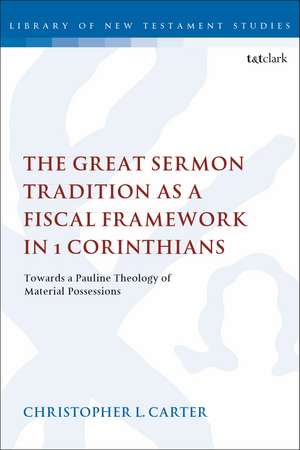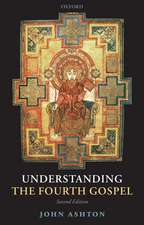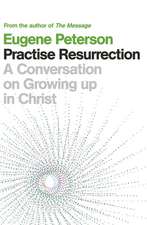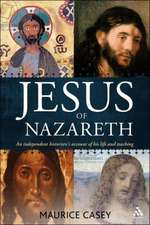The Great Sermon Tradition as a Fiscal Framework in 1 Corinthians: Towards a Pauline Theology of Material Possessions: The Library of New Testament Studies
Autor Dr Christopher L. Carteren Limba Engleză Paperback – 26 iun 2019
This text addresses two separate but related questions. Firstly, what is Paul's theology of material possessions, and secondly, what is the source of the apostle's thought on this subject? Carter endeavours to answer these questions by posing the hypothesis that Paul owes his pecuniary thought to the synoptic sermon tradition. Unlike other studies that investigate this link, Carter does not appeal to verbal parallels to establish this theory. Rather, he demonstrates a continuity in the broad fiscal thought of Jesus and Paul. This is accomplished by first demonstrating the plausibility of Paul's acquaintance with the dominical tradition through evidence related to the apostle's historical environment and his extant writings.
The author then establishes the likelihood that Paul knew the pre-synoptic sermon tradition because of its ubiquity in early church discipleship, the judgment of form critical scholars, and its pervasive resonances in Pauline literature. From this point of embarkation, Carter moves on to articulate the broad fiscal thought of the synoptic sermons. It is found that the synoptic sermons' fiscal material has a pervasively eschatological orientation, and that in the sermons, Jesus seeks to redefine the financial worldview of Christian disciples.
Having examined the synoptic sermons, their fiscal thought is compared with that expressed by Paul in 1 Corinthians. Through the course of this comparison, alternate sources in Jewish and Hellenistic literature are considered as potential explanations for any correspondences. Ultimately, the study concludes that Jesus' and Paul's financial thought evidence remarkable symmetry that cannot be explained by a shared cultural environment. Consequently, it is determined that Paul very likely depends on the dominical tradition for the contours of his financial thought.
| Toate formatele și edițiile | Preț | Express |
|---|---|---|
| Paperback (1) | 98.92 lei 3-5 săpt. | +22.98 lei 7-13 zile |
| Bloomsbury Publishing – 26 iun 2019 | 98.92 lei 3-5 săpt. | +22.98 lei 7-13 zile |
| Hardback (1) | 949.98 lei 6-8 săpt. | |
| Bloomsbury Publishing – 2 dec 2009 | 949.98 lei 6-8 săpt. |
Din seria The Library of New Testament Studies
- 34%
 Preț: 509.52 lei
Preț: 509.52 lei - 22%
 Preț: 832.58 lei
Preț: 832.58 lei - 22%
 Preț: 832.09 lei
Preț: 832.09 lei - 24%
 Preț: 190.33 lei
Preț: 190.33 lei - 22%
 Preț: 832.65 lei
Preț: 832.65 lei - 23%
 Preț: 191.31 lei
Preț: 191.31 lei -
 Preț: 221.70 lei
Preț: 221.70 lei - 31%
 Preț: 830.87 lei
Preț: 830.87 lei - 22%
 Preț: 834.60 lei
Preț: 834.60 lei - 22%
 Preț: 831.59 lei
Preț: 831.59 lei - 30%
 Preț: 717.05 lei
Preț: 717.05 lei - 22%
 Preț: 835.03 lei
Preț: 835.03 lei - 30%
 Preț: 511.40 lei
Preț: 511.40 lei - 24%
 Preț: 190.33 lei
Preț: 190.33 lei -
 Preț: 158.77 lei
Preț: 158.77 lei - 30%
 Preț: 510.04 lei
Preț: 510.04 lei - 22%
 Preț: 832.99 lei
Preț: 832.99 lei - 30%
 Preț: 509.52 lei
Preț: 509.52 lei - 22%
 Preț: 832.80 lei
Preț: 832.80 lei - 22%
 Preț: 831.76 lei
Preț: 831.76 lei - 22%
 Preț: 834.93 lei
Preț: 834.93 lei - 22%
 Preț: 831.59 lei
Preț: 831.59 lei - 22%
 Preț: 832.41 lei
Preț: 832.41 lei - 22%
 Preț: 832.99 lei
Preț: 832.99 lei -
 Preț: 414.71 lei
Preț: 414.71 lei - 30%
 Preț: 773.65 lei
Preț: 773.65 lei - 22%
 Preț: 834.93 lei
Preț: 834.93 lei - 14%
 Preț: 511.81 lei
Preț: 511.81 lei -
 Preț: 222.16 lei
Preț: 222.16 lei - 30%
 Preț: 775.67 lei
Preț: 775.67 lei - 30%
 Preț: 1012.49 lei
Preț: 1012.49 lei - 30%
 Preț: 509.02 lei
Preț: 509.02 lei - 30%
 Preț: 656.90 lei
Preț: 656.90 lei -
 Preț: 469.92 lei
Preț: 469.92 lei -
 Preț: 471.68 lei
Preț: 471.68 lei -
 Preț: 173.21 lei
Preț: 173.21 lei - 30%
 Preț: 833.64 lei
Preț: 833.64 lei - 22%
 Preț: 834.93 lei
Preț: 834.93 lei - 31%
 Preț: 772.17 lei
Preț: 772.17 lei - 30%
 Preț: 774.20 lei
Preț: 774.20 lei - 14%
 Preț: 1124.92 lei
Preț: 1124.92 lei - 22%
 Preț: 948.51 lei
Preț: 948.51 lei - 14%
 Preț: 1128.84 lei
Preț: 1128.84 lei - 31%
 Preț: 1065.91 lei
Preț: 1065.91 lei - 22%
 Preț: 777.71 lei
Preț: 777.71 lei - 31%
 Preț: 1064.84 lei
Preț: 1064.84 lei - 22%
 Preț: 1063.44 lei
Preț: 1063.44 lei - 22%
 Preț: 889.49 lei
Preț: 889.49 lei - 22%
 Preț: 1006.06 lei
Preț: 1006.06 lei
Preț: 98.92 lei
Nou
Puncte Express: 148
Preț estimativ în valută:
18.93€ • 19.82$ • 15.66£
18.93€ • 19.82$ • 15.66£
Carte disponibilă
Livrare economică 15-29 martie
Livrare express 01-07 martie pentru 32.97 lei
Preluare comenzi: 021 569.72.76
Specificații
ISBN-13: 9780567689290
ISBN-10: 0567689298
Pagini: 288
Dimensiuni: 156 x 234 x 15 mm
Greutate: 0.4 kg
Editura: Bloomsbury Publishing
Colecția T&T Clark
Seria The Library of New Testament Studies
Locul publicării:London, United Kingdom
ISBN-10: 0567689298
Pagini: 288
Dimensiuni: 156 x 234 x 15 mm
Greutate: 0.4 kg
Editura: Bloomsbury Publishing
Colecția T&T Clark
Seria The Library of New Testament Studies
Locul publicării:London, United Kingdom
Caracteristici
Tthe shift of Christianity towards the second and third world makes the study timely and broadly appealing.
Cuprins
Contents
Acknowledgments
Abbreviations
Chapter 1
Introduction
1 The Paul/Jesus Debate
2 Paul's Attitude towards Material Possessions
3 Objectives and Method
Chapter 2
The Authenticity of The Great Sermon Tradition
1 Ethics and Authenticity
2 Orality and Authenticity
3 Text and Authenticity
4 Conclusion
Chapter 3
Paul's General Interest in The Historical Jesus and His Specific Knowledge of The Great Sermon Tradition
1 Inconclusive Indifference
2 Inconclusive Texts
3 Suggestive Circumstances
4 Suggestive Texts
5 Discipleship, Ethics, and The Great Sermon Tradition
6 Conclusion
Chapter 4
The Fiscal Worldview of the Great Sermons
1 Eschatology as a Hermeneutical Framework
2 An Otherworldly Perspective
3 The Ethical Implications of an Otherworldly Perspective
4 The Relational Priority of an Otherworldly Perspective
5 Impending Judgment
6 Conclusion
Chapter 5
1 Corinthians vis á vis the Great Sermon Tradition
1 Introductory Considerations
2 Eschatology as a hermeneutical framework
3 An otherworldly perspective
4 The Ethical Implications of an Otherworldly Perspective
5 The relational priority of an otherworldly perspective
6 Impending Judgment
7 Conclusion
Chapter 6
Paul and Jesus vis á vis Jewish and Greco-Roman Fiscal Thought
1 Fiscal Thought in Biblical Judaism
2 Fiscal Thought in Second Temple Judaism(s)
3 Fiscal Thought in the Greco-Roman World
4 Conclusions
5 Summary
Chapter 7
Conclusions and Further Refection
1 Paul's Theology of Material Possessions
2 The Source of Paul's Fiscal Thought
3 Further Reflection
Works Cited
Acknowledgments
Abbreviations
Chapter 1
Introduction
1 The Paul/Jesus Debate
2 Paul's Attitude towards Material Possessions
3 Objectives and Method
Chapter 2
The Authenticity of The Great Sermon Tradition
1 Ethics and Authenticity
2 Orality and Authenticity
3 Text and Authenticity
4 Conclusion
Chapter 3
Paul's General Interest in The Historical Jesus and His Specific Knowledge of The Great Sermon Tradition
1 Inconclusive Indifference
2 Inconclusive Texts
3 Suggestive Circumstances
4 Suggestive Texts
5 Discipleship, Ethics, and The Great Sermon Tradition
6 Conclusion
Chapter 4
The Fiscal Worldview of the Great Sermons
1 Eschatology as a Hermeneutical Framework
2 An Otherworldly Perspective
3 The Ethical Implications of an Otherworldly Perspective
4 The Relational Priority of an Otherworldly Perspective
5 Impending Judgment
6 Conclusion
Chapter 5
1 Corinthians vis á vis the Great Sermon Tradition
1 Introductory Considerations
2 Eschatology as a hermeneutical framework
3 An otherworldly perspective
4 The Ethical Implications of an Otherworldly Perspective
5 The relational priority of an otherworldly perspective
6 Impending Judgment
7 Conclusion
Chapter 6
Paul and Jesus vis á vis Jewish and Greco-Roman Fiscal Thought
1 Fiscal Thought in Biblical Judaism
2 Fiscal Thought in Second Temple Judaism(s)
3 Fiscal Thought in the Greco-Roman World
4 Conclusions
5 Summary
Chapter 7
Conclusions and Further Refection
1 Paul's Theology of Material Possessions
2 The Source of Paul's Fiscal Thought
3 Further Reflection
Works Cited
Recenzii
"An Assemblies of God missionary, Carter steps into the fray that has raged for two centuries on whether Paul invented Christianity or faithfully followed the footsteps of Jesus. It turns out, however, that he is merely crossing that battlefield to get to the virtually unexplored territory of Paul's theology of material possessions. Paul's attitude towards possessions resonates strongly with the teaching of Jesus as represented in the synoptic Gospels, he says, and that double track marks the route of his study. He considers the authenticity of the great sermon tradition, Paul's general interest in the historical Jesus and his specific knowledge of the great sermon tradition, the fiscal worldview of the great sermons, 1 Corinthians vis-a-vis the great sermon tradition, and Paul and Jesus viv-a-vis Jewish and Greco-Roman fiscal thought." -Eithne O'Leyne, BOOK NEWS, Inc.
"This investigation of Paul's theology of material possessions suggests that his fiscal thought derives from Jesus in one way or another. After a sixteen-page introduction, it treats the following topics: the authenticity of the great sermon tradition (underlying the Sermon on the Mount and the Sermon on the Plain); Paul's general interest in the historical Jesus and his specific knowledge of the great sermon tradition; the fiscal worldview of the great sermon; 1 Corinthians vis-a-vis the great sermon tradition; and Paul and Jesus vis-a-vis Jewish and Greco-Roman fiscal thought. Carter concludes that in 1 Corinthians Paul's fiscal thought world has been heavily influenced by the Jesus tradition that he received at some point, most likely in the form of the great sermon tradition." -New Testament Abstracts, Vol. 54
"This investigation of Paul's theology of material possessions suggests that his fiscal thought derives from Jesus in one way or another. After a sixteen-page introduction, it treats the following topics: the authenticity of the great sermon tradition (underlying the Sermon on the Mount and the Sermon on the Plain); Paul's general interest in the historical Jesus and his specific knowledge of the great sermon tradition; the fiscal worldview of the great sermon; 1 Corinthians vis-a-vis the great sermon tradition; and Paul and Jesus vis-a-vis Jewish and Greco-Roman fiscal thought. Carter concludes that in 1 Corinthians Paul's fiscal thought world has been heavily influenced by the Jesus tradition that he received at some point, most likely in the form of the great sermon tradition." -New Testament Abstracts, Vol. 54










